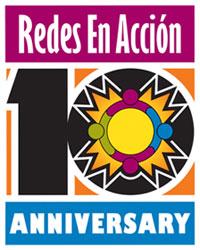
Redes 10th Anniversary Logo
A decade ago, Redes En Acción launched its operations with a national center and six strategically located regional offices across the country. The mission: to develop a nationwide network – a veritable army – of collaborators to fight cancer in Latinos on three fronts – research, training and public awareness.
Now the National Cancer Institute-funded Redes program is celebrating its 10th anniversary and some remarkable strides in this battle. Today the Redes En Acción network numbers more than 1,800 researchers, medical professionals, educators, community organization administrators, government agency leaders, students and others.
“We’ve come a long way,” said Amelie G. Ramirez, DrPH, Redes Principal Investigator. “We started this initiative in 2000 with a handful of researchers who had worked together on Latino cancer issues for a number of years.
“From that core, we’ve expanded the number of collaborators tremendously and made very significant progress in our efforts to reduce and eliminate cancer health disparities among the Latino population – both within our individual communities and across the country.” To view a video highlighting Redes' 10 years of accomplishments, click here.
Examples of the diverse national organizations and agencies Redes En Acción has formed collaborative partnerships with include the Cancer Information Service (CIS) of NCI, Latino Council on Alcohol and Tobacco, Susan G. Komen for the Cure, National Institute of General Medical Sciences, National Human Genome Research Institute, NCI Specialized Programs of Research Excellence, NCI Cancer Genetics Networks, and Women’s Health Initiative. Redes En Acción has also collaborated with NCI-designated cancer centers, academic institutions and community organizations within each of the program’s regional sites.
Initially, the program received support under the NCI’s Special Populations Networks (SPN) initiative. In 2005, the NCI funded Redes En Acción as part of its Community Networks Program (CNP) initiative to address cancer disparities among minority and underserved populations.
Research
Essential to success in this effort has been the Redes program’s achievements in initiating and promoting research related to cancer in Latinos. Over the past 10 years, the NCI – through Redes En Acción – funded 18 studies in the pilot research program, a key component of the initiative’s research activities. NCI support for the studies totaled $900,000.
Each pilot project was required to produce results that could be leveraged into subsequent peer-reviewed funding, such as an R01-type NIH proposal. To date, the pilot investigators have been awarded 88 subsequent competitive grants totaling more than $96 million in funding – a 100-fold return on their NCI pilot developmental awards.
In addition to the pilot program, which primarily provided career-development opportunities for young researchers, Redes En Acción has supported numerous cancer studies directed by established investigators as well. Since 2000, Redes-related cancer research projects at both the national and regional levels surpassed $96 million in leveraged funding from public and private sources. Redes En Acción researchers have directed or participated in – through subcontracts or shared resources – 85 new or ongoing cancer projects.
Communities have benefitted from the research agenda represented by these studies in various ways: for example, preventing or reducing smoking among youths in local schools, promoting breast and cervical cancer screening services, preventing obesity in Latino home and community environments, and providing clinical trial education to underserved women. Specific diseases targeted in investigations include breast, prostate, cervical, lung and colorectal cancers.
Training
During the past decade, the training component of Redes En Acción has attracted and introduced Latinos to cancer fields by promoting cancer-related education activities for 225 Latino undergraduate and graduate student interns, pre- and post-doctoral trainees, and junior faculty.
The training program has provided unique opportunities to work with and receive mentorship from established cancer investigators. These relationships have enhanced the research skills and knowledge of cancer prevention and control in Hispanic populations among the young Latinos in the program.
For example, intern projects have included development of grant proposals, manuscripts and surveys; statistical programming/analysis; literature reviews; and data collection in tobacco research and other Latino health issues. Pre- and post-doctoral trainees have worked in community health promotion, clinical trial recruitment, data analysis, cancer genetics, and other research-related projects. Funded junior faculty worked toward developing a pilot project application, grant proposal or a manuscript for publication to a peer-reviewed journal, while unfunded trainees worked closely with Redes En Acción and other Latino researchers on cancer prevention and control projects.
Awareness
In addition to its research and training efforts, Redes En Acción has developed wide-ranging public education and communications activities, including Web sites, newsletters, events and presentations, mass media products and general publications.
The Web site, which averages 70,000 visits a year, details the initiative’s research, training and awareness activities, as well as Latino disparities data, publications available to the public, investigators’ scientific publications, and other information about the program.
Quarterly newsletters complement the Web site with news of current Redes En Acción activities nationwide and profiles of Latino professionals engaged in cancer control and prevention in the program’s various regions. More than 105 such role models have been spotlighted in the Redes newsletter over the course of the initiative.
Regionally, Redes staff members around the country have raised cancer awareness in the public through more than 2,462 community and professional events. These include health fairs, anti-smoking and breast cancer awareness programs, and neighborhood center and school events.
Educational efforts also include an array of print and video tools designed to raise awareness of cancer risks and screening resources available to Latinos. These resources include a series of bilingual Buena Vida publications that offer information on cancer topics, clinical trials, screening procedures, the importance of diet and exercise, and smoking prevention and cessation.
Redes En Acción has also produced television and radio PSAs (public service announcements) promoting Latino clinical trial participation and a series of TV spots in Spanish and English focusing on cervical, colorectal and breast cancers.
In addition, the Redes program has developed and distributed more than 200 news stories, ads and press releases about Latino cancer issues, which were printed or broadcast by national, regional and local media.



